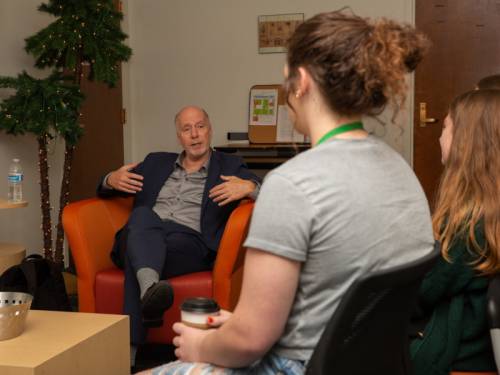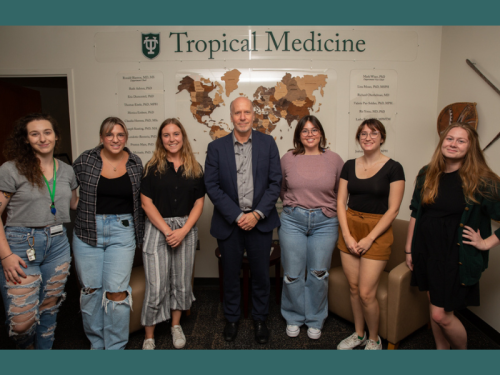A 'Swiss army knife' of tropical medicine and global health

After a long and varied career, Dr. Daniel Bausch (Tulane Infectious Disease Fellowship and MPH&TM ’94) now serves as something of a “Swiss army knife” of tropical medicine and global health. But instead of a multi-functional knife, he relies on a multi-faceted team and network of experts in medicine, virology, diagnostic development, economics, and more.
Bausch, former professor and now adjunct at the Tulane School of Public Health and Tropical Medicine, is senior advisor for global health security at FIND in Geneva, Switzerland, a global non-profit promoting development and equitable access to diagnostics.
The position cuts across a broad range of disciplines to develop and implement diagnostics for surveillance and response to pandemic threats, including emerging viruses and antimicrobial resistant bacteria.
In many ways, this role is the sum of many diverse experiences since he first began in internal medicine and infectious diseases in the mid-1990s.
“I’ve been incredibly fortunate to have really diverse experiences that not many people are lucky enough to get,” he states. This experience “probably makes me an expert in none of them but provides me with an awareness of how they can all fit together.”
Indeed, Bausch has served as the doctor in charge of an Ebola treatment unit. He’s conducted epidemiologic field studies. He’s trapped bats in the Democratic Republic of the Congo looking for Marburg virus and rodents in Africa and Bolivia looking for Lassa and hantaviruses. He’s conducted studies assessing the impact of building roads in the Peruvian Amazon on rodent-spread disease. And he’s worked in a Biosafety Level 4 laboratory at the U.S. Centers for Disease Control and Prevention (CDC).
Bausch served on the Tulane faculty from 1996 to 2017, based in New Orleans from 2003 to 2011 but for the rest of time seconded to various international organizations, including the CDC in Atlanta, the U.S. Naval Medical Research Unit No. 6 in Lima, Peru, and the World Health Organization in Geneva, Switzerland.
In 2017 he accepted a post as the first director of the United Kingdom Public Health Rapid Support Team, a joint effort with the London School of Hygiene and Tropical Medicine, where he would assist organizations and countries in response to outbreaks. At least half of the outbreaks he responded to were preventable by a vaccine. The solution was there—but it wasn’t getting to where it was needed.
“We need to do a lot of work to make sure that these tools get all the way through and to the people in need,” says Bausch. “And that requires a lot thought about the systems that exist. What’s the manufacturing base? What’s the pipeline? What’s the storage capacity? What are the challenges to implementation?”

Advice to the next generation
He advises students to remain open and not become overly focused on one particular career path too early.
“It can be very tough when you say ‘this is the only door I want to knock on,’” he cautions. “I got into hemorrhagic fevers because in 1996 CDC wanted someone to start a Lassa fever program in West Africa…But if CDC wanted someone to work on schistosomiasis or something else, I would’ve done that, too.”
Language skills (he is fluent in English, French, and Spanish) also opened doors for him, and he encourages students to include learning another language in their toolkit.
Finally, he advises students to not be afraid to fail or spend some time on activities that may not seem like their initial area of interest. A young person coming out of training can spend a year or two expanding their horizons, he says, even if it doesn’t specifically fit within a grand career plan. These explorations will pay off with experience. “Learn some things, try some things, and don’t be afraid.”
On top of his work at FIND, Bausch maintains an appointment as a professor at the London School of Hygiene and Tropical Medicine, where he is presently completing a study of an Ebola vaccine in the Congo. He is also returning for a second year as president of the American Society of Tropical Medicine and Hygiene (ASTMH), something he admits can be hard to fit into a busy schedule but is worth the effort, giving him an avenue to think and advocate regarding big picture topics beyond his day job. In particular, he has worked with the society to put a greater focus on human rights as “inseparable from tropical medicine and global health,” as he shared in his presidential address at the ASTMH annual meeting in November 2022.
